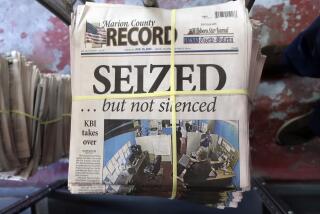Superhighway Robbery : Crime waves on the Internet
- Share via
The real-life story of computer hacker Kevin Mitnick reads like a fast-paced Hollywood script: A young resident of the San Fernando Valley rides the computer superhighway in a crime spree, breaking into the Los Angeles Unified School District’s main computer, the North American Air Defense Command computer and telephone and cellular networks. After a prison term, he flees when he becomes the target of a new investigation. He eludes authorities for two years--until he taps into the home computer of Tsutomu Shimomura, a San Diego computational physicist and cybersleuth.
Shimomura tracked Mitnick, now 31, to Raleigh, N.C., where he was apprehended last Wednesday. When Mitnick met his nemesis for the first time in court, he said: “Hi Tsutomu. I respect your skills.”
That may make a nice Hollywood ending, but the electronic terrorism with which Mitnick is linked illustrates the alarming vulnerability of new technology to a sticky web of fraud and abuse.
Many incursions of the sort connected to Mitnick are clearly illegal--theft of data files and credit card numbers from computer systems. However, a host of activities by high-tech highwaymen, in addition to presenting complicated new challenges to national, corporate and personal security, call out for new legal definitions of property rights, pornography and privacy.
Much of the give-and-take that Internet users enjoy depends on collegial trust and mutual forbearance, as Scientific American staff writer Paul Wallich pointed out in his 1994 article “Wire Pirates.” Yet the global network is being traveled by electronic impersonators, sophisticated hackers and pornographers, almost all of whom operate anonymously or under the cover of code names.
Most criminal laws that apply to published material--pornography, for example--have not been applied to the Internet. The unanticipated downside of the technological and information revolution ought to cause us to stop and take stock.
Mitnick’s obsessive computer hacking began when he was attending Monroe High School in North Hills. He was convicted of computer fraud, spent a year in prison and then violated probation.
After he was taken in custody last week, Mitnick was charged with two federal crimes--illegal use of a telephone access device and computer fraud. Authorities also are considering charging him in connection with break-ins on the Internet.
The issues that are arriving with the Information Age promise to demand extraordinary responses in the areas of law, ethics and technology. Catching Mitnick may come to seem easy compared to finding a way to safeguard the information highway.






